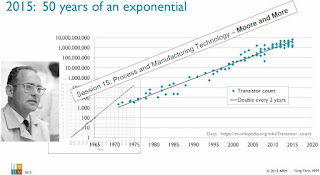 |
| Image Source: SemiWiki.com |
Topics: Consumer Electronics, Electrical Engineering, Materials Science, Semiconductor Technology
It was bound to happen. The smaller feature sizes gets, the more powerful that computer in your pocket you occasionally use to call someone and talk becomes, as you can pack literally more on the surface of Silicon substrates in billions of bits (so we can share cat videos, apparently). It also becomes increasingly difficult to manufacture such things, i.e. more expensive for the manufacturer in design, materials, processes and manpower. The old expression "somethings got to give" applies here. We're all hoping for something beyond Silicon, like carbon nanotubes.
Intel Puts the Brakes on Moore’s Law
Intel will slow the pace at which it rolls out new chip-making technology, and is still searching for a successor to silicon transistors.
Chip maker Intel has signaled a slowing of Moore’s Law, a technological phenomenon that has played a role in just about every major advance in engineering and technology for decades.
Since the 1970s, Intel has released chips that fit twice as many transistors into the same space roughly every two years, aiming to follow an exponential curve named after Gordon Moore, one of the company’s cofounders. That continual shrinking has helped make computers more powerful, compact, and energy-efficient. It has helped bring us smartphones, powerful Internet services, and breakthroughs in fields such as artificial intelligence and genetics. And Moore’s Law has become shorthand for the idea that anything involving computing gets more capable over time.
But Intel disclosed in a regulatory filing last month that it is slowing the pace with which it launches new chip-making technology. The gap between successive generations of chips with new, smaller transistors will widen. With the transistors in Intel’s latest chips already as small as 14 nanometers, it is becoming more difficult to shrink them further in a way that's cost-effective for production.
MIT Technology Review: Intel Puts The Brakes on Moore's Law, Tom Simonite
Comments